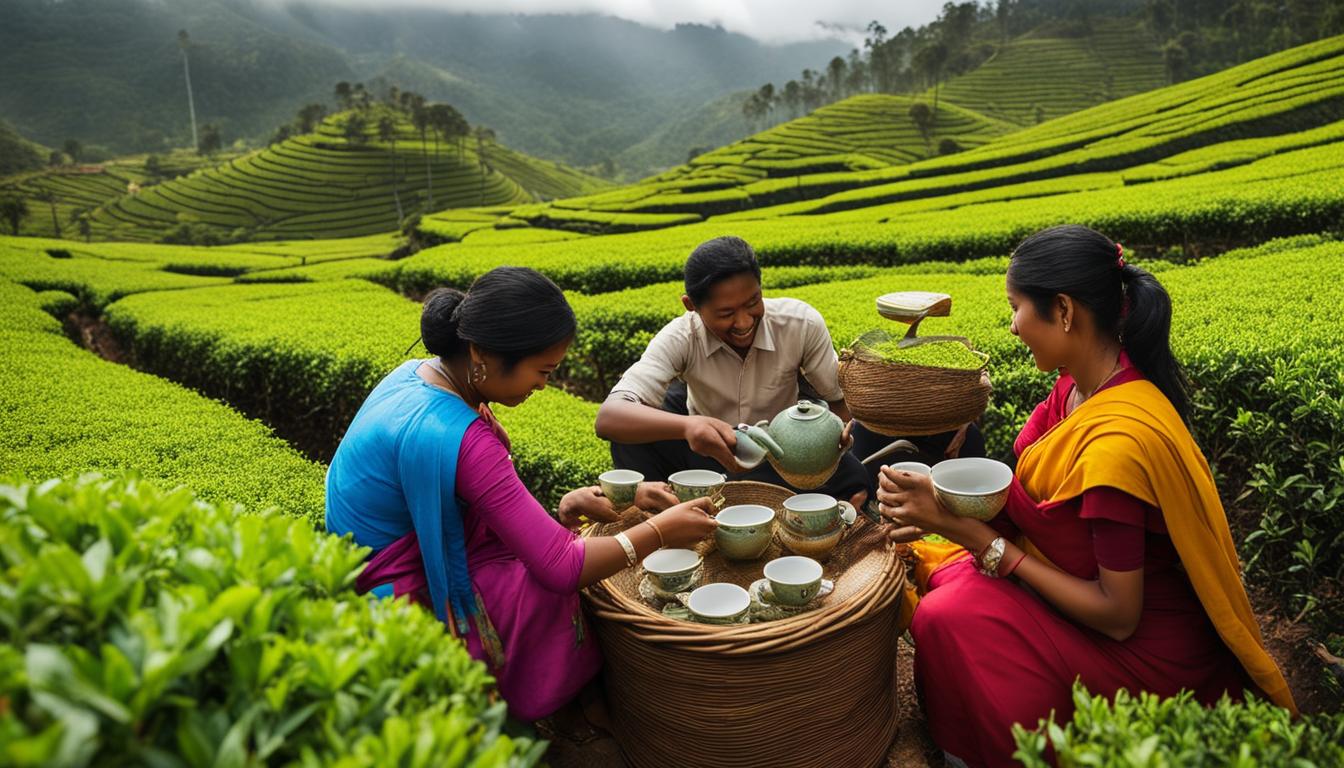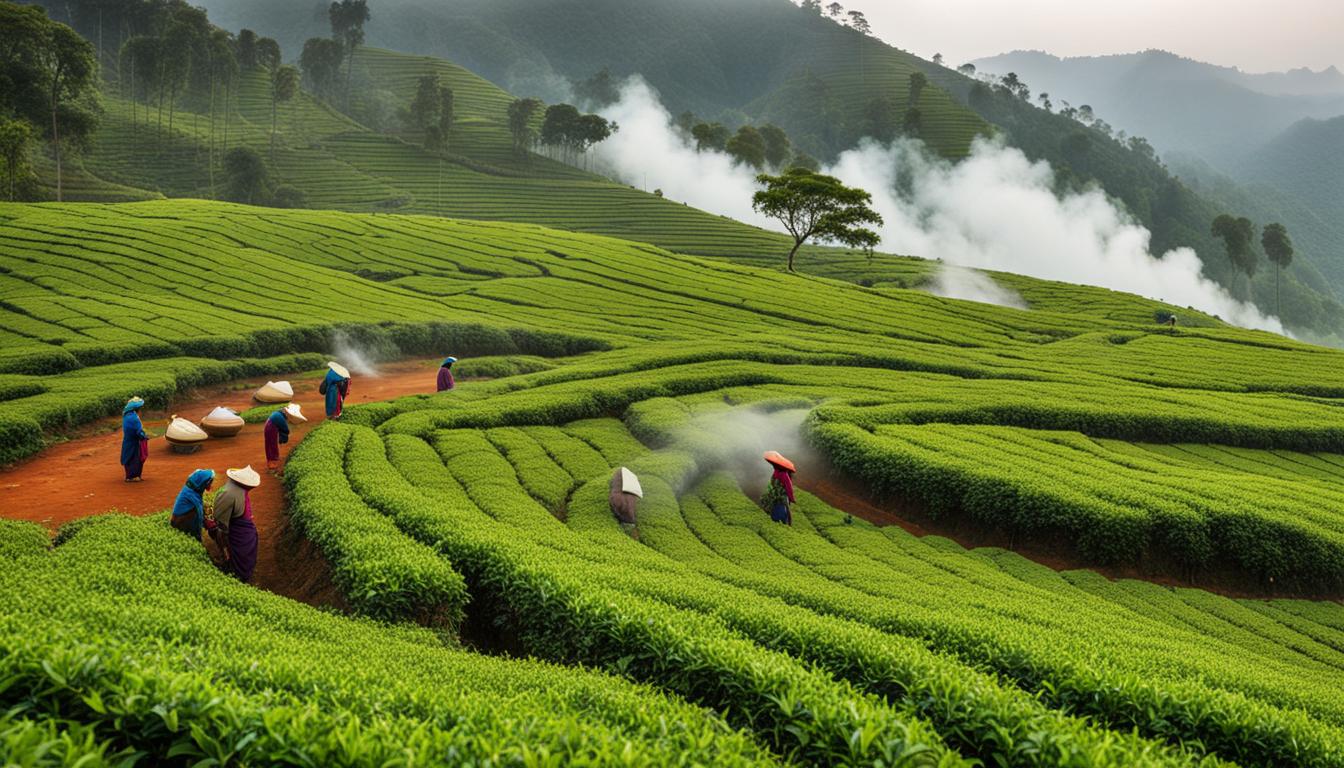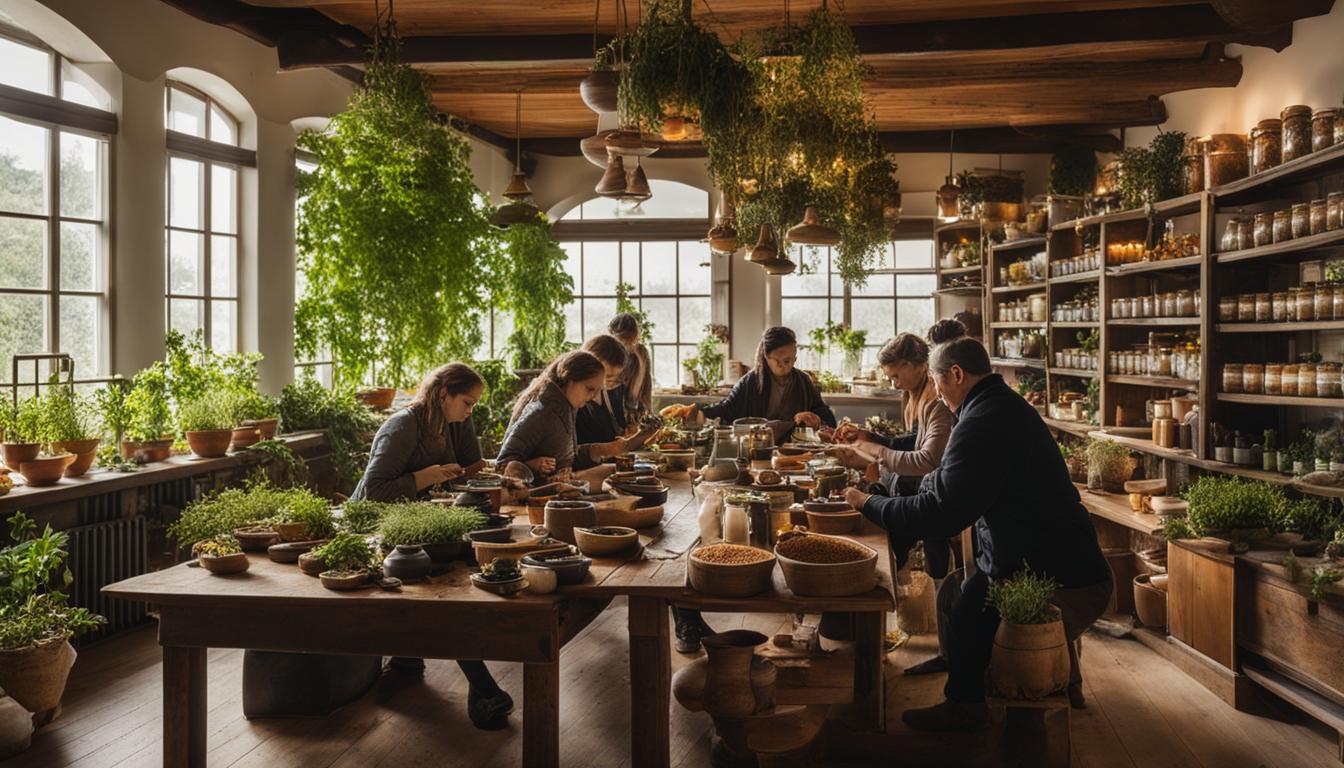Greetings, tea enthusiasts! Today, we embark on a journey through the fascinating world of tea tourism. Join us as we explore the profound impact this delightful form of travel has on local communities and the unique benefits it brings. Get ready to sip on some knowledge and discover the local impact of tea estate visits!
Key Takeaways:
- Tea tourism plays a crucial role in the development of local communities.
- Visiting tea estates brings economic growth and employment opportunities.
- Tea tourism helps preserve the culture and traditions of tea-growing regions.
- Choosing sustainable practices and promoting community involvement is essential for the long-term benefits of tea tourism.
- Hands-on experiences in tea tourism provide a deeper understanding of the tea production process.
The Sustainable Practices of Tea Tourism
Sustainable practices play a crucial role in tea tourism. It is essential to choose tea tours that prioritize environmentally friendly practices, such as organic and natural tea gardens. By engaging in tea farm tourism, visitors not only get to experience the beauty of tea estates but also contribute to the economic effects on local communities.
Community involvement is another key aspect of sustainable tea tourism. When local stakeholders are actively involved in tea tourism activities, it promotes equitable economic growth. Community members can benefit from tourism by providing services, selling locally made products, or showcasing their cultural heritage.
Ensuring the sustainability of tea tourism requires a balance between economic growth and environmental conservation. Organic and natural tea gardens help preserve biodiversity and reduce the use of chemical pesticides, protecting the surrounding ecosystems. Additionally, community involvement fosters a sense of pride and ownership over the tourism industry, leading to long-term preservation of local traditions and customs.
Tea tourism offers a unique opportunity to explore the world of tea while also supporting local communities. By choosing tea tours that prioritize sustainable practices and community involvement, we can ensure that future generations can continue to enjoy the wonders of tea while benefiting the communities that cultivate it.
| Benefits of Sustainable Tea Tourism | Environmental Impact | Economic Effect on Local Communities |
|---|---|---|
| Promotes biodiversity conservation | Reduces the use of chemical pesticides | Creates employment opportunities |
| Preserves local traditions and customs | Protects ecosystems | Generates income for local businesses |
| Enhances cultural appreciation | Minimizes carbon footprint | Supports community development projects |
Promoting Cultural Engagement in Tea Tourism
Tea tourism not only offers visitors a chance to explore the world of tea, but it also provides a platform for cultural engagement and the preservation of local traditions. When participating in tea tours, tourists have the opportunity to learn about the customs, traditions, and cultural significance of tea in the communities they visit, promoting the local culture and creating lasting social impacts.
By immersing themselves in the local culture, tourists can gain a deeper understanding of the traditions and practices associated with tea production. They can witness firsthand the intricate rituals of tea preparation, such as the art of tea pouring or the pottery used in tea ceremonies. These experiences enhance cultural appreciation and create a sense of connection with the local community.
Furthermore, tea tourism encourages interaction with local residents, providing opportunities for cultural exchange and fostering connections between tourists and the community. Tourists can engage in conversations with tea farmers, listen to their stories, and gain insights into their way of life. This direct interaction allows for a more authentic and meaningful experience, enabling visitors to appreciate the rich heritage of the tea-producing regions.
The Role of Local Culture in Tea Tourism
The local culture plays a pivotal role in tea tourism, as it adds depth and authenticity to the overall experience. Whether it’s witnessing traditional tea-making techniques or participating in cultural activities, tourists can actively engage with the local culture and contribute to its preservation. This cultural exchange creates a positive impact on the community by fostering pride and appreciation for their heritage.
By promoting cultural engagement in tea tourism, we not only support the local economy but also contribute to the sustainable development of the tea-producing regions. It is crucial to prioritize the preservation and celebration of local culture in tea tourism initiatives, ensuring that these communities continue to flourish and thrive for generations to come.
Table: Cultural Engagement in Tea Tourism
| Benefits of Cultural Engagement | Examples |
|---|---|
| Preservation of traditions | Tea ceremonies |
| Enhanced cultural appreciation | Traditional tea-making demonstrations |
| Opportunities for cultural exchange | Interacting with local tea farmers |
| Community pride and celebration | Participating in local festivals |
Through cultural engagement in tea tourism, visitors can contribute to the social fabric of the tea-producing communities while also enriching their own travel experiences. By embracing the local culture and traditions, we can create a more inclusive and sustainable future for tea tourism.
Sustainability Parameters for Tea Tourism
When engaging in tea tourism, it is crucial to consider sustainability parameters to ensure that the benefits of this industry are distributed fairly among the community and contribute to the local economy. Community engagement and local economic development are key factors in maintaining a sustainable tea tourism practice.
One important parameter is to choose tea gardens that prioritize community engagement. This means that the local community should be involved in the decision-making process and have a say in how tea tourism activities are conducted. By actively involving the community, tea tourism can foster a sense of ownership and empower local stakeholders.
Another parameter for sustainable tea tourism is to ensure that the local economy benefits from this industry. This can be achieved by supporting local businesses, such as restaurants, accommodations, and handicraft producers. By providing opportunities for local entrepreneurs, tea tourism can stimulate economic growth and create a more sustainable future for the community.
In summary, when engaging in tea tourism, it is important to prioritize sustainability by considering parameters such as community engagement and local economic development. By doing so, tea tourism can have a positive impact on the community, ensuring that the benefits are distributed fairly and contribute to the overall local economy.
The Role of Community Engagement
Community engagement is a crucial aspect of sustainable tea tourism. When visiting tea gardens, it is important to choose those that actively involve the local community in decision-making processes and ensure that the benefits of tourism are shared among community members. This not only creates a sense of ownership and empowerment but also helps to foster long-term sustainability by ensuring that the local community can actively participate in and benefit from the tea tourism industry.
Local Economic Development
Another important sustainability parameter for tea tourism is local economic development. To ensure that tea tourism contributes to the local economy, it is crucial to support local businesses and entrepreneurs. By promoting and patronizing local restaurants, accommodations, and handicraft producers, tea tourism can stimulate economic growth and create a more sustainable future for the community. This not only helps to create employment opportunities but also ensures that the economic benefits of tea tourism stay within the local community.
Involving the Community in Decision Making
One way to ensure community engagement in tea tourism is by actively involving the local community in decision-making processes. This can include consulting with community members on matters relating to tourism activities, seeking their input on how such activities are conducted, and giving them a say in the development and implementation of tourism initiatives. By involving the community, tea tourism can benefit from local knowledge and expertise while fostering a sense of ownership and pride among community members.
Supporting Local Businesses
To promote local economic development, it is important to support local businesses. This can be done by patronizing local restaurants, accommodations, and handicraft producers, as well as promoting their products and services to visitors. By directing tourism spending towards local businesses, tea tourism can contribute directly to the local economy and create a more sustainable and vibrant community.
Summary
When engaging in tea tourism, it is essential to consider sustainability parameters that prioritize community engagement and local economic development. Through active involvement of the community in decision-making processes and support for local businesses, tea tourism can have a positive and lasting impact on the community, contributing to overall local economic growth and ensuring a sustainable future for all.
Authentic Cultural Engagement in Tea Tourism
When it comes to tea tourism, one of the key factors that sets it apart is the opportunity for authentic cultural engagement. Unlike other forms of tourism, tea tourism allows visitors to immerse themselves in the rich traditions and customs of the local communities they visit. From participating in tea ceremonies to exploring local festivals and interacting with residents, tea tourism offers a unique way to connect with the cultural fabric of a region.
One of the best ways to experience authentic cultural engagement in tea tourism is by participating in tea ceremonies. These ceremonies are not only steeped in tradition but also offer visitors the chance to learn about the significance of tea in the local culture. Whether it’s the elaborate rituals of a Japanese tea ceremony or the simplicity of a Chinese tea ceremony, these experiences provide a deeper understanding of the role of tea in the daily lives of the people.
Tea ceremonies are the epitome of authentic cultural engagement, allowing visitors to witness firsthand the respect, grace, and beauty associated with tea in different cultures.
Another way to engage with the local culture is by attending or participating in local festivals. Many tea-growing regions have festivals dedicated to celebrating the harvest or the cultural heritage of tea. These festivals often feature traditional performances, music, dance, and, of course, plenty of opportunities to sample different types of tea. It’s a chance to witness the vibrant traditions of the community and be a part of their joyous celebrations.
Interacting with local residents is also vital for a meaningful cultural experience. Tea tourism often provides opportunities to visit tea estates and interact with tea farmers and workers. These interactions can offer insights into their way of life, their challenges and aspirations, and their deep-rooted connection with tea. By engaging with the locals, tourists can gain a more profound appreciation for the role of tea in shaping their identities and communities.
The Significance of Cultural Engagement in Tea Tourism
Cultural engagement in tea tourism goes beyond simply observing or participating in activities. It is about fostering mutual understanding and appreciation for different cultures, promoting respect and empathy, and preserving traditions for future generations. By embracing authentic cultural engagement, tea tourism not only benefits the local communities but also enriches the experiences of the visitors, creating lasting memories and connections.
Hands-On Experiences in Tea Tourism
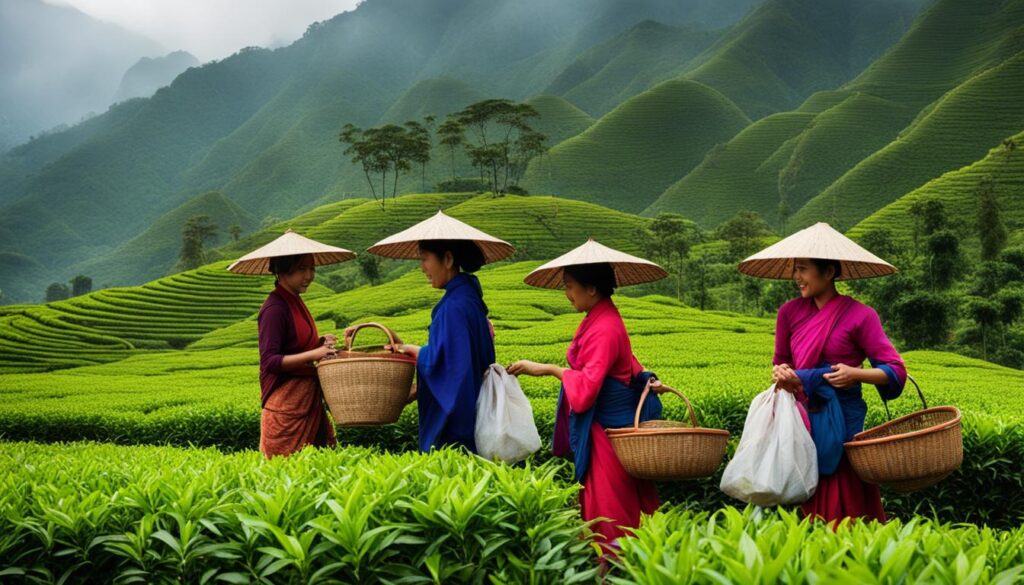
When it comes to tea tourism, one of the most exciting aspects is the opportunity for hands-on experiences. These activities allow tourists to immerse themselves in the world of tea production and gain a deeper understanding of the intricate processes involved. Whether it’s plucking tea leaves, sorting them, or witnessing the firing process, these hands-on experiences offer a unique and memorable adventure for tea enthusiasts.
Tea plucking, in particular, is a fascinating activity that allows visitors to learn about the art of harvesting tea leaves. Under the guidance of experienced tea farmers, tourists can try their hand at carefully picking the tender leaves, ensuring they are plucked at the perfect stage of growth. This hands-on experience not only provides a connection to nature but also highlights the dedication and skill required in producing high-quality tea.
Another captivating activity in tea tourism is tea sorting. This process involves carefully examining the plucked leaves and separating them based on size, color, and quality. By participating in tea sorting, tourists can gain insight into the meticulous attention to detail that goes into ensuring a consistent and superior tea product. They can also appreciate the importance of quality control in the tea industry.
| Hands-On Experiences in Tea Tourism | Description |
|---|---|
| Tea Plucking | Visitors can participate in the process of harvesting tea leaves, learning about the art of plucking at the ideal stage of growth. |
| Tea Sorting | Tourists can engage in the meticulous task of examining and separating tea leaves based on size, color, and quality. |
| Tea Firing | Witnessing the firing process allows visitors to observe how leaves are transformed through heat, resulting in the distinctive flavors of tea. |
Lastly, observing the tea firing process is an integral part of tea tourism. This step involves exposing the plucked leaves to heat to halt the oxidation process and develop the unique flavors of each tea variety. By witnessing this transformation firsthand, tourists can gain a deeper appreciation for the skill and expertise required in crafting different types of tea.
Overall, hands-on experiences in tea tourism provide a dynamic and interactive way for visitors to engage with tea production. These activities not only allow tourists to connect with nature and experience the traditions of tea-making but also foster a deeper understanding and appreciation for the artistry and craftsmanship involved in creating the perfect cup of tea.
Immersive Tea Tours: Examples and Recommendations
When it comes to experiencing tea tourism at its best, there are a few immersive tea tours that stand out. These tours offer visitors a chance to delve deep into the world of tea, explore beautiful tea gardens, and engage with local communities. Two outstanding examples are the Nepal Tea Collective and the Green Tea Homestay in Higashi Sonogi, Japan.
Nepal Tea Collective
The Nepal Tea Collective offers a ten-day tour that takes visitors on a journey through the picturesque tea gardens of Nepal. This immersive experience allows participants to learn from tea farmers, witness the tea production process firsthand, and taste a wide variety of teas. From exploring the foothills of the Himalayas to savoring the unique flavors of Nepali teas, this tour provides an unforgettable adventure for tea enthusiasts.
During the Nepal Tea Collective tour, visitors also have the opportunity to engage with local communities and learn about the cultural significance of tea in Nepal. This not only enhances the tea tourism experience but also contributes to the sustainable development of these communities.
Green Tea Homestay
If you’re looking for a more intimate tea tourism experience, the Green Tea Homestay in Higashi Sonogi, Japan, offers the perfect opportunity. This homestay provides visitors with the chance to live with a local family and immerse themselves in the daily life of a tea-growing community.
Guests can participate in tea-related activities such as tea plucking, tea processing, and tea ceremonies. They can also explore the beautiful tea gardens of Higashi Sonogi and learn about the traditional techniques used in tea cultivation.
By choosing the Green Tea Homestay, visitors not only gain a deeper understanding of the tea industry but also support the local community directly. The income generated from the homestay program contributes to the sustainable development of the region and helps preserve the unique cultural heritage associated with tea.
Discover the World of Tea
These immersive tea tours offer a unique opportunity to explore the world of tea, engage with local communities, and create lasting memories. Whether you choose to embark on the Nepal Tea Collective tour or experience the Green Tea Homestay in Japan, you’ll be immersing yourself in the rich history, culture, and flavors of tea.
So, if you’re a tea lover looking for an unforgettable travel experience, consider these immersive tea tours and get ready to embark on a journey into the fascinating world of tea.
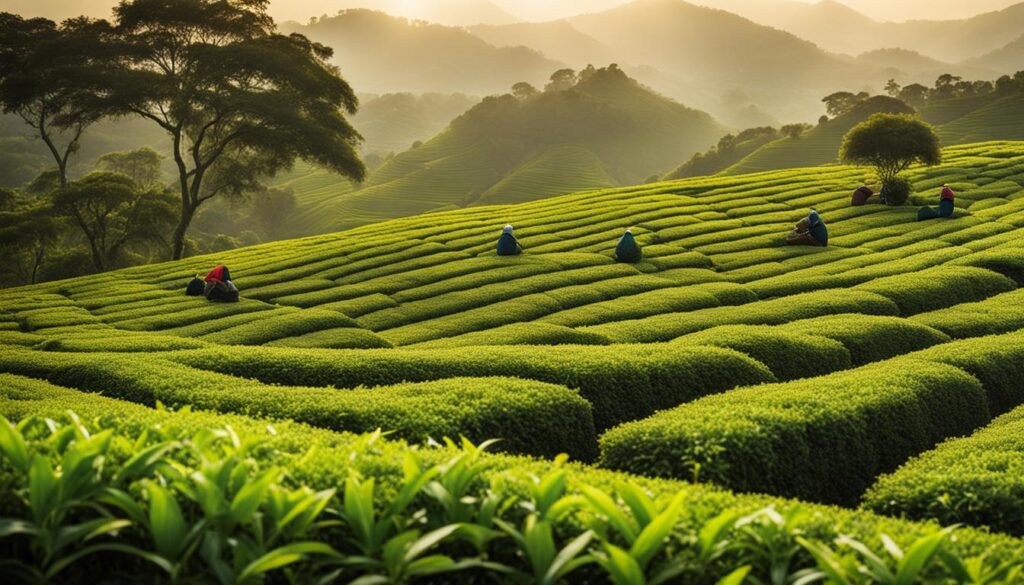
Conclusion
We’ve explored the significant impact of tea tourism on local communities, highlighting its role in promoting economic growth, cultural preservation, and sustainable practices. Tea tours provide a unique opportunity for visitors to immerse themselves in the world of tea while supporting the development of local communities.
By prioritizing authentic cultural engagement, tourists can learn about the customs, traditions, and cultural significance of tea in the communities they visit, creating lasting social impacts. Additionally, hands-on experiences, such as tea plucking and sorting, offer a deeper understanding of the tea production process and the hard work behind creating that perfect cup of tea.
When choosing a tea tour, it’s important to select those that prioritize sustainability and community involvement. This ensures that benefits are distributed fairly among community members, contributing to overall local economic growth. For an immersive experience, consider options like the Nepal Tea Collective, which offers a ten-day tour exploring Nepali tea gardens, or the Green Tea Homestay in Higashi Sonogi, Japan, where visitors can stay with a local family and participate in tea-related activities.
So, let’s raise our teacups to tea tourism, where a sip of tea can make a difference in the lives of both the locals and the visitors. Choose a tour that embraces authenticity, community involvement, and sustainability, and embark on a journey to discover the fascinating world of tea while positively impacting the communities you visit.
FAQ
What benefits does tea tourism bring to local communities?
Tea tourism brings economic growth, employment opportunities, and cultural preservation to local communities.
What sustainable practices are important in tea tourism?
It is essential to choose tea tours that prioritize environmentally friendly practices, such as organic and natural tea gardens. Community involvement is also crucial for equitable economic growth.
How does tea tourism promote cultural engagement?
Tea tourism provides a platform for tourists to learn about the customs, traditions, and cultural significance of tea in the communities they visit, thereby promoting the local culture and creating lasting social impacts.
What parameters should be considered for sustainable tea tourism?
Engaging with tea gardens that prioritize community engagement and local economic development ensures the benefits of tea tourism are distributed fairly and contribute to overall local economic growth.
How can tourists engage in authentic cultural experiences during tea tourism?
Tourists can experience local customs, traditions, and festivals by interacting with local residents, participating in cultural activities, and exploring unique aspects of the local culture.
What hands-on experiences can tourists have in tea tourism?
Tourists can participate in activities such as tea plucking, tea sorting, and tea firing, gaining a deeper understanding of the tea production process and the hard work behind creating a perfect cup of tea.
Can you recommend any immersive tea tours?
The Nepal Tea Collective offers a ten-day tour that allows visitors to explore Nepali tea gardens, learn from tea farmers, and taste a variety of teas. Another option is the Green Tea Homestay in Higashi Sonogi, Japan, where visitors can stay with a local family and participate in tea-related activities.
What is the impact of tea tourism on local communities?
Tea tourism promotes economic growth, cultural preservation, and sustainable practices in local communities, providing benefits for both visitors and locals.

